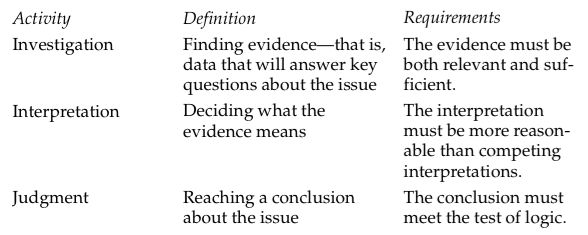Vocabulary
pigheaded adj. 顽固的,固执的
infallible adj. 不可能错的,不会犯错误的,永无过失的
mannerism n. 某人特有的说话或动作的习性,习气,习惯
think: appreciate consult fancy reason believe contemplate imagine reflect cerebrate deliberate meditate ruminate cogitate digest muse speculate conceive discuss ponder suppose consider dream realize weigh
Expression
Mental indolence is one of the commonest of human traits.
思想懒惰是人最常见的特质之一。
In contrast to feeling, thinking is a conscious mental process performed to solve a problem, make a decision, or gain understanding.
相反,思考是用于解决问题、做出决定或取得理解而进行的有意识的精神过程。
Some cases of plagiarism are attributable to intentional dishonesty, others to carelessness.
有些抄袭案是故意欺诈,有一些是粗心大意。(这一点说的十分有理,习惯问题,中国人很少能意识到自己是抄袭。)
Summary
What Is Critical Thinking?
Three broad categories of thinking involve reflective thinking, creative thinking, and critical thinking, among which our focus is on critical thinking. The essence of critical thinking is evaluation. Thus, critical thinking can be defined as the process by which we test claims and arguments and determine which have merit and which do not. It is a search for answers, a quest, indicating that one of the most important techniques used in critical thinking is asking probing questions. Another is control of one’s mental activities.
One misconception is that being able to support beliefs with reasons makes one a critical thinker, which rules out the truth that everyone has reasons, weak or strong. The test of critical thinking is whether the reasons are good and sufficient. Another misconception is critical thinkers never imitate others in thought or action. But critical thinking is more about making sound decisions, regardless of how common or uncommon those decisions are. Moreover, critical thinking involves the process of finding answers when they are not so readily available, instead of just having a lot of right answers in one’s head. It can be learned and controlled easily.
Excerpt
Critical thinking also employs questions to analyze issues. Consider, for example, the subject of values. When it is being discussed, some people say, “Our country has lost its traditional values” and “There would be less crime, especially violent crime, if parents and teachers emphasized moral values.” Critical thinking would prompt us to ask,
1. What is the relationship between values and beliefs? Between values and convictions?
2. Are all values valuable?
3. How aware is the average person of his or her values? Is it possible that many people deceive themselves about their real values?
4. Where do one’s values originate? Within the individual or outside? In thought or in feeling?
5. Does education change a person’s values? If so, is this change always for the better?
6. Should parents and teachers attempt to shape children’s values?
批判思考的基本活动
Critical Thinking and Discussion
Whenever possible, prepare in advance. 只要可能,提前做准备。
Set reasonable expectations. 设定合理的预期。
Leave egotism and personal agendas at the door. 抛弃自我中心。
Contribute but don’t dominate. 起作用但不主导一切。
Avoid distracting speech mannerisms. 避免分散注意力的讲话习惯。
Listen actively. 积极的倾听。
Judge ideas responsibly. 负责任地判断思想。
Resist the urge to shout or interrupt. 抵制喊叫或打断的冲动。
Thought
Your experience may have been similar to Arthur's. In other words, many people may have simply told you to think without ever explaining what thinking is and what qualities a good thinker has that a poor thinker lacks.
反思:我在教学的过程中也会遇到类似问题。有时我鼓励孩子思考,但他们的确不知道要思考什么。其实思考从本质上来说就是问问题和回答,一个优秀的思考者强在问问题的和回答的质量上,所以教会孩子思考就是教会孩子如何问问题。
I feel and I think are sometimes used interchangeably, but that practice causes confusion. Feeling is a subjective response that reflects emotion, sentiment, or desire; it generally occurs spontaneously rather than through a conscious mental act. We don't have to employ our minds to feel angry when we are insulted, afraid when we are threatened, or compassionate when we see a picture of a starving child. The feelings arise automatically.
“我想”和“我感觉”是两种不同的脑部活动,一个自动产生,一个有个人意识的增补。这有点像我们常说的“理性”和“感性”。
